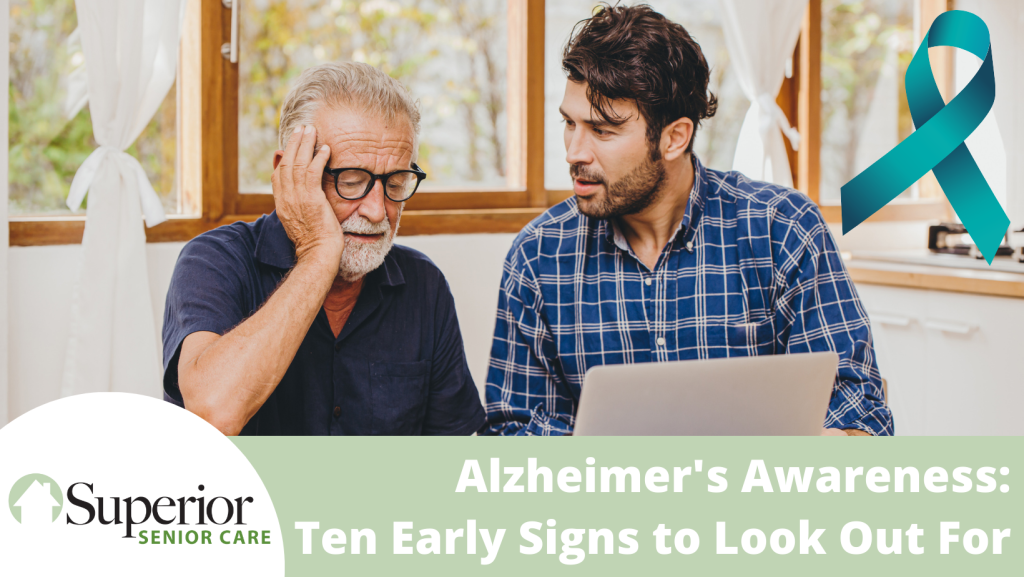
November is the Alzheimer’s Foundation of America (AFA)’s Alzheimer’s Awareness Month. And, with the holidays just around the corner, this is the time to become more aware of how to recognize early signs. Alzheimer’s disease is the most common form of dementia. The disease is a progressive neurological disorder that affects memory, thinking, and behavior. Recognizing the early signs can lead to a timely diagnosis and better management of the condition. There are medications available that can slow down progression of the disease, so early detection is important. If you notice any of these signs in yourself or loved ones, seek medical advice as soon as possible.
Here are ten important signs to be aware of:
1. Memory Loss that Disrupts Daily Life
It’s common for people to be forgetful with age. But, Alzheimer’s patients tend to forget recently learned information. This is a common early sign. This can include forgetting important dates or events. They may ask the same question repeatedly or repeat information over and over.
2. Challenges in Planning or Solving Problems
Individuals may experience difficulty in developing and following a plan, such as managing monthly bills or following a familiar recipe. They may take longer to do normal things or have difficulty concentrating. They may also become confused or frustrated while doing normal tasks.
3. Difficulty Completing Familiar or Simple Tasks
Trouble with routine tasks at home, work, or leisure, such as driving to a familiar location or remembering the rules of a favorite game, can be indicative of Alzheimer’s disease. Tasks as simple as getting dressed or preparing food may become difficult for them to do. And they may forget to operate everyday appliances like the oven or television.
4. Confusion with Time or Place
Losing track of dates, seasons, and the passage of time is a common symptom. Alzheimer’s can cause people to forget where they are or how they got there. Or they may forget social events or medical appointments.
5. Visual Images and Spatial Relationships May Become a Problem
When Alzheimer’s affects brain cells, people may have trouble with reading and writing. This can also affect balance when standing or walking, causing falls. They may also experience vision and spatial awareness issues leading to trouble with judging distances.
6. Problems with Speaking or Writing
Along with the memory loss that Alzheimer’s causes, patients my start to forget what they are saying causing them to repeat themself. They may struggle with vocabulary, have trouble following or joining a conversation, or repeat themselves. And they may have issues with physically writing. Many people with Alzheimer’s eventually fail to recognize family and friends, forgetting names of people and places.
7. Misplacing Things and Losing the Ability to Retrace Steps
Placing items in unusual places and being unable to find them later is a common issue. Sometimes, they may accuse others of stealing items that have simply been misplaced. It’s common for people with Alzheimer’s to forget that they have left something cooking on the stove.
8. Decreased or Poor Judgment
People with Alzheimer’s may experience changes in their judgment or decision-making. They may make poor financial decisions or neglect their personal grooming and hygiene.
9. Withdrawal from Work or Social Activities
A person may start to remove themselves from hobbies, social activities, or other engagements, possibly due to changes they are experiencing. They may withdraw due to fear or frustration from the onset of the disease. Or they may feel embarrassed by their memory loss or their inability to hold a conversation.
10. Changes in Mood and Personality
Mood swings or personality changes are common with Alzheimer’s patients. They may become confused, suspicious, depressed, fearful, or anxious. Severe mood fluctuations can indicate a more progressed stage of Alzheimer’s disease.
As we approach the holiday season, this is a good time to educate yourself on the early indicators of Alzheimer’s. With this knowledge you can help your elder parents or grandparents by recognizing these signs early. To facilitate a timely diagnosis and allow for planning and management of Alzheimer’s disease. If you or someone you know is experiencing any of these symptoms, it is important to consult a healthcare professional. Having an in-home caregiver can also help to recognize early signs of Alzheimer’s or help those living with Alzheimer’s live more comfortably while staying in their own home.
Are you looking for an In-Home Caregiver?
Superior Senior Care is Arkansas’s oldest, most trusted name in in-home care services. We prioritize your peace of mind. We offer referrals for a variety of levels of elderly care and services, with both short and long-term options. All the senior caregivers on our registry undergo thorough screenings and comprehensive background checks. And they are trained to work with clients in everything from household duties to grocery shopping. We’ve helped families with a variety of chronic conditions including dementia, Alzheimer’s disease, arthritis, Parkinson’s disease, lung disease and more.
For more information on our home health services offering, please contact us today at (888) 503-5879 or visit our website at https://www.superiorseniorcare.com/our-services/
As the first accredited registry in Arkansas, we have more than 35 years of experience and thousands of happy customers. Access to our large client registry means stability for you and the best chance to match you with just the right family. Interested in becoming a caregiver on our registry? Fill out and electronically submit our pre-screening referral application here: https://www.superiorseniorcare.com/caregiving-opportunities/

